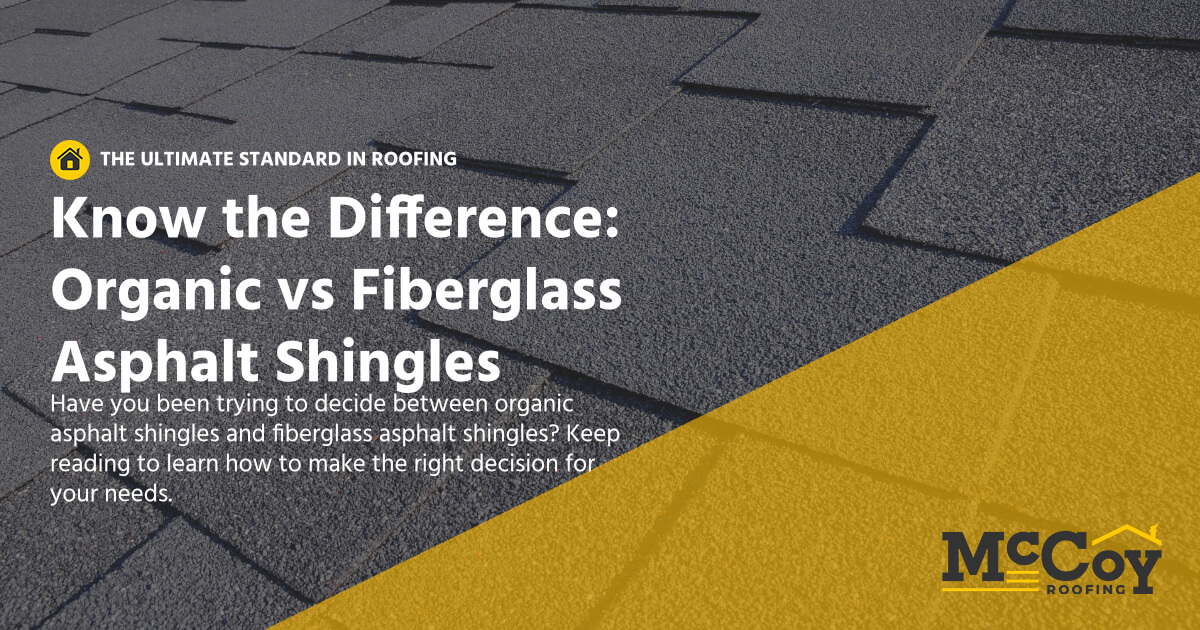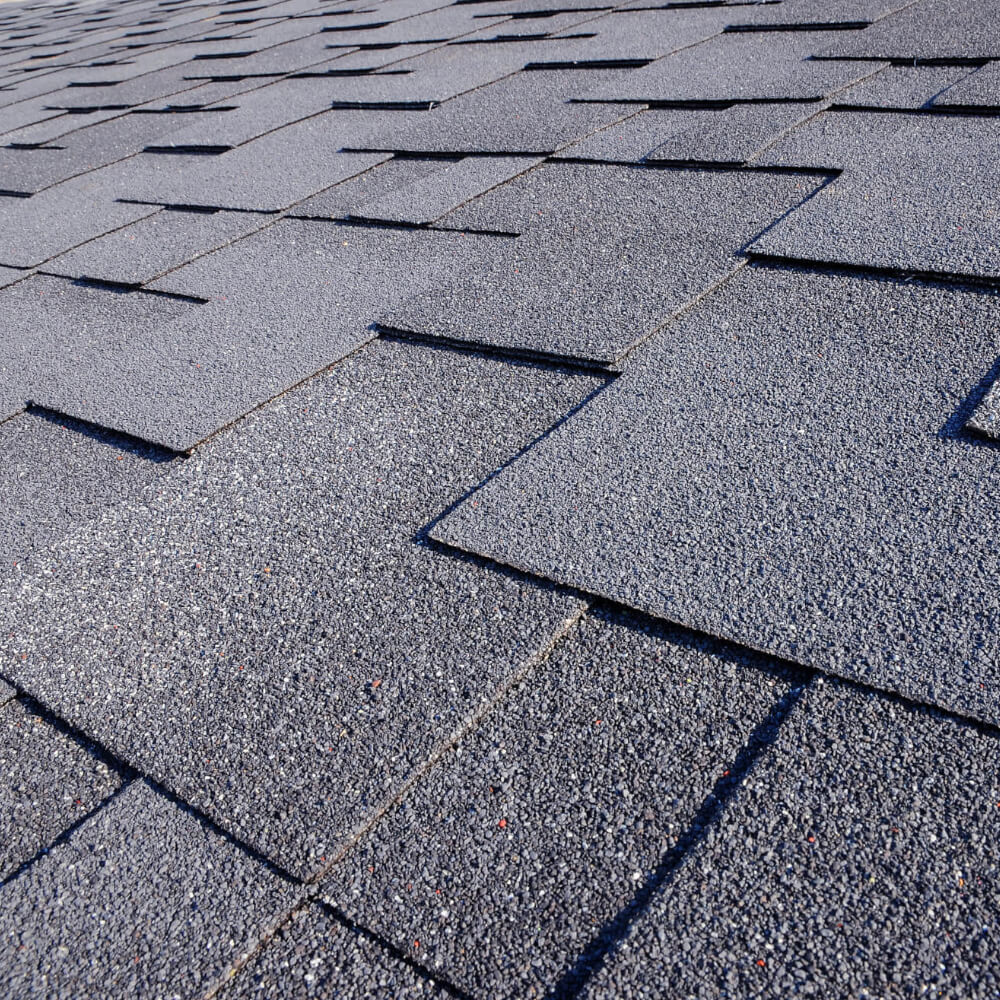

Know the Difference: Organic Asphalt vs Fiberglass Asphalt Shingles
Have you been trying to decide between organic asphalt shingles and fiberglass asphalt shingles? Keep reading to learn how to make the right decision for your needs.

The gentle pitter-patter of raindrops on a roof is one of the most relaxing sounds in nature unless you have a compromised roof. Once the sound turns to a constant drip from your ceiling to your floor, rain becomes the hazard that keeps homeowners up at night.
Any new roof will increase the value and thus the resale value of your home. With the right roof, you can hope to recover up to nearly 63 percent of the installation cost when your home value increases.
But how does a person know what type of shingles to get? Roofing varies. Keep reading to learn about asphalt shingles and the difference between organic asphalt singles and fiberglass asphalt shingles.
Organic Asphalt Shingles
Whenever we hear the word “organic,” we think of environmentally friendly materials or some sort of natural material. In the world of shingles, “organic” means non-synthetic shingles.
An organic asphalt shingle roof is a common roofing style. Organic asphalt shingles distinguish themselves they consist of paper or felt that designers soak in asphalt. Then manufacturers coat the shingle with an additional layer of asphalt and then ceramic granules.
This process creates a waterproof shingle that can withstand the intensity of Midwestern weather. For example, a special coating protects the shingle and your roof from UV rays during the direct sunlight in summer. Additionally, engineers add reachable paint to create algae-resistant shingles which are perfect for the high humidity experienced in Nebraska.
This coating makes the shingles resistant to algae and discoloration.
What Makes Organic Asphalt Shingles Better?
Organic asphalt shingles have proven themselves to be a durable shingle, with some brands lasting up to 20 years. They’re weather, algae, and discoloration resistant.
Also, organic asphalt shingles perform well in cold weather. Other, thinner shingles are not as substantial and tend to become brittle and break while under the duress of extremely cold temperatures.
Organic asphalt shingles perform well and guard against the extreme swings of the Nebraska climate.
How Much Do They Cost?
Organic asphalt shingles are one of the most cost-effective roof solutions. Asphalt shingles cost less in general than other types of shingles, but organic shingles in particular can cost half the cost of other roofing alternatives.
Fiberglass Asphalt Shingles
Fiberglass asphalt shingles differ from organic asphalt shingles in that they do not have the paper or felt base. They have a fiberglass base.
Fiberglass asphalt shingles begin with a mat of wet fiberglass held together with urea-formaldehyde resin. Manufacturers then soak the mat asphalt that has mineral fillers in it. This process creates a waterproof shingle.
At first glance, fiberglass shingles look the same as organic shingles. You can even install them the same way, so you do not need a roofer with specialized experience or training. Both organic and fiberglass asphalt shingles are made from asphalt and granules; their difference lies in their base.
What Makes Fiberglass Asphalt Shingles Better?
Because of their fiberglass base, fiberglass asphalt shingles are more fire-resistant than organic asphalt shingles. They do not have the flammable paper or felt base, making them a better shingle for hot climates. They’re both fire retardant and heat resistant.
On the downside, fiberglass shingles do not tolerate cold temperatures as well as organic asphalt shingles. Low temperatures cause fiberglass to become brittle, making them prone to breaking.
Solutions to Algae Problems
Also, fiberglass shingles without any treatment are rich in alkaline, attract algae, and end up looking dirty. When the algae build-up, the shingles do not protect your home as well against the intense heat of the sun. Thus fiberglass shingles lead to a warmer house and higher energy costs.
Engineers have found a solution for the algae problem with fiberglass shingles. They coat the shingles with copper which prevents discoloration and long-term damage from algae and moss. The coating makes shingles more costly, adding 10 to 15 percent in installation costs.
Ultimately, a layer of glass fiber makes the fiberglass shingle absorb less moisture, resist more heat, and last longer in warm climates.
Environmentally Friendly
Plus, fiberglass shingles are lighter than organic asphalt shingles. This means a truck is able to haul more, creating a more environmentally friendly delivery process. These shingles are also nonporous, and thus they do not change shape or dry out.
Time Saver
Fiberglass shingles install easily. If you have a single layer of shingles, you can install the fiberglass asphalt shingles directly over the old layer. You save time and money removing and hauling away an old roof. If you have two or more shingle layers on your roof, you need to remove the old layer first.
Fiberglass shingles are durable. The shingles last 25 to 50 years, whereas traditional asphalt shingles last 15 to 20 years.
Various Styles
You have a choice of two different styles when you select fiberglass asphalt shingles.
The 3 tab shingle is the most affordable and simple.
The architectural shingle is the more expensive shingle, often used on high-end homes. Engineers have designed the architectural shingle to look like tile roofing or wood roofing.
Money Saver
Fiberglass asphalt shingles have a lower environmental impact. They’re easier to transport, thus lowering your carbon footprint.
Plus , manufacturers have adopted energy-saving, cool-roof technology to prevent a roof from absorbing great amounts of heat. As you shop around, look for shingles with Energy Star rated shingles. Energy Star certified roofing can reduce the AC needed by reducing peak cooling demand by up to 10 to 15 percent.
How Much Do Fiberglass Asphalt Shingles Cost?
Asphalt shingles as a whole are among the most affordable roofing options. With that said, fiberglass does cost more than organic shingles. You can plan on spending anywhere from $8,500 to $16,500 depending on the slope, pitch, and size of your roof.
You also need to consider the cost when you look at the shingles’ durability. Fiberglass asphalt shingles last up to twice as long as organic asphalt shingles.
Cover Up and Rest Easy
You can rest easy when the rain falls if you know you have a good roof over your head. Take some time to check out our work. Whether you’re looking for asphalt shingles or something else, we have all the roofing solutions you need. As always, we’ll be upfront and honest. We’ll help you pick the right product for your budget and home situation.
Give us a call at 402-616-7304 for a free estimate. We’d love to help you out.